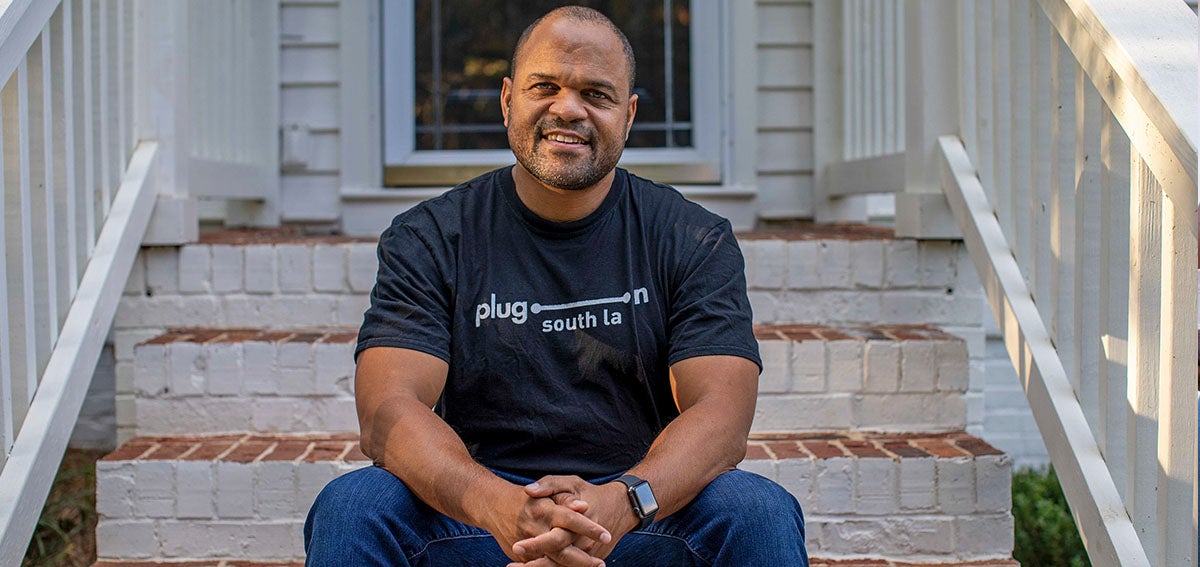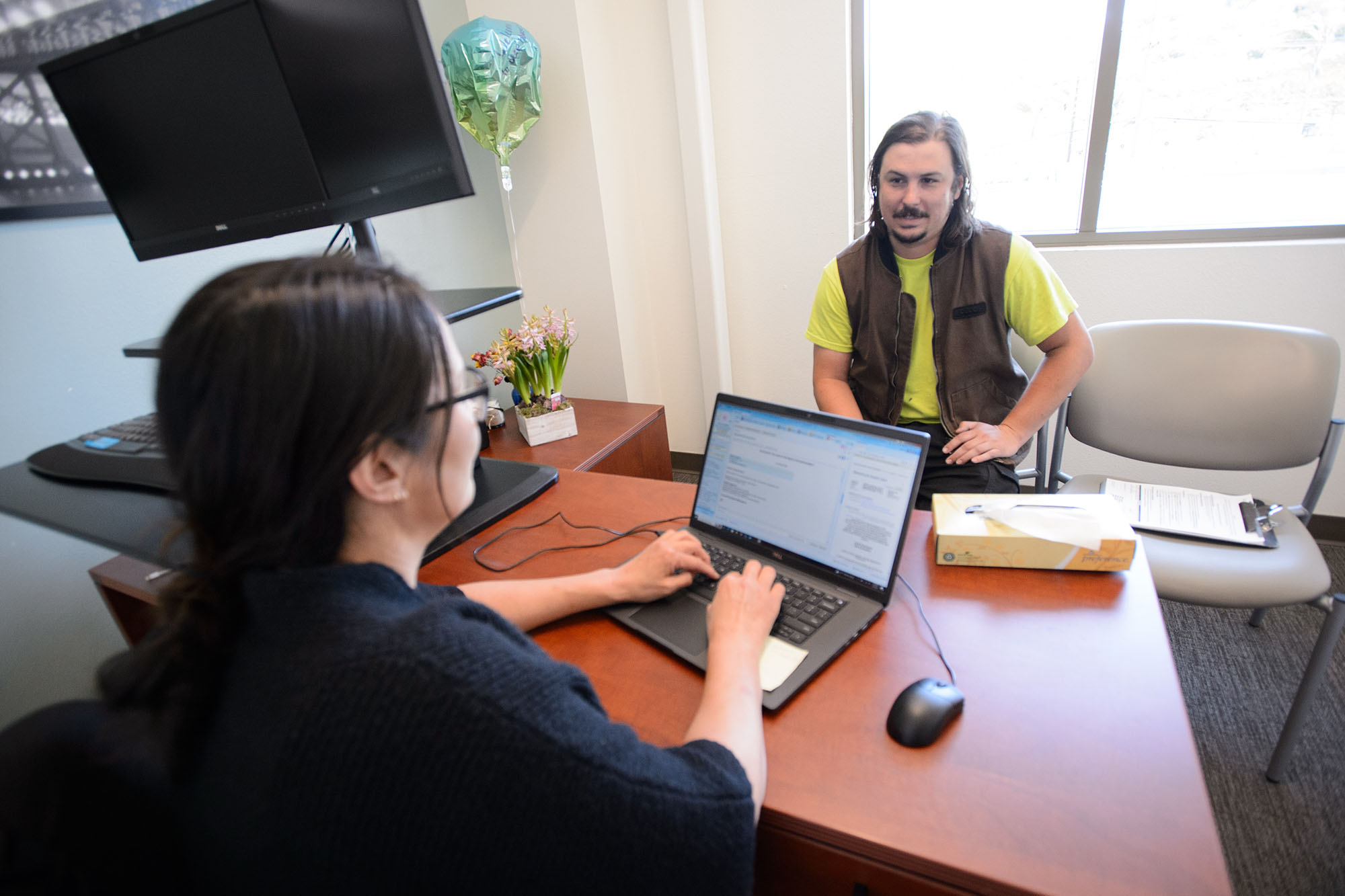
When working nights at a San Diego hospital, Steven Moyo, MD, saw many patients whose illnesses could have been prevented had they gotten better access to medical care and health information they could relate to.
“Health education was one of the big things that was missing,” said Moyo, who is board certified in internal medicine. “Doctors would give patients a six-page article to read, but everything you get from your doctor ends up in the back seat of the car.”

Moyo’s experiences led him to co-found Welfie, a health-tech startup that aims to improve health literacy for vulnerable adults and children. The 2-year-old company offers a “wellness selfie,” a digital screening tool that delivers personalized health information and referrals to health and social services. Along the way, Moyo and his co-founders have partnered with tech accelerators for financial and technical support as they grow their business, including Plug In South LA. Tech accelerators are organizations that help early-stage tech companies develop products, scale their business models, and network with investors.
The California Health Care Foundation’s Innovation Fund has been directly investing in health technology companies for more than a decade. That work includes supporting tech accelerators, like Plug In South LA, Startup Health, Visible Hands, Village Capital, and Prime Health — organizations that assist entrepreneurs of color who may be shut out of funding opportunities by Silicon Valley’s venture capital community.
The Innovation Fund invests in health tech companies at an early stage and prioritizes startups founded by women and people of color. Whether through accelerators or direct investments, the fund’s goal is to give early support to companies with the potential to significantly lower health costs or improve access to care for Californians with low incomes. CHCF’s financial support “has been incredibly helpful in allowing us to leverage our resources and our network to support founders in ways we would not have been able to otherwise,” said Derek Smith, founder of Plug In South LA.
Smith’s accelerator program helps Black and Latino/x entrepreneurs fine-tune their business plans, market research, and investment pitches before introducing them to potential investors. Building a company takes time and access to capital, Smith said, and many founders he works with don’t have those luxuries, despite their “huge potential.”
“The expectation is that Black and Brown founders need to have a market-ready product from Day One,” he said. “It’s almost like a double standard.”
Medicaid Investment Opportunities
CHCF Health Equity Fellow Janet Boachie experienced those barriers personally before she started working with the Innovation Fund. She was an entrepreneur who was developing a voice and mobile platform to help patients view their health care options. Now Boachie works with fund-supported accelerators and founders and is helping to develop a curriculum for founders and investors that focuses on identifying business opportunities for innovation in the Medicaid sphere.
“Being a female health tech founder of color is hard already,” Boachie said. “It’s hard to make connections yourself. Sometimes, the door is already closed before you even try to open it. I’m excited about this accelerator work because its key benefit is relationship-building, which is critical to the success of a startup. The resources and mentorship that I had going through an accelerator were good, but in hindsight it really could have been better. I want today’s founders to have more access to the relationships, resources, and opportunities they need to succeed, especially in health care.”
Interest is growing in the importance of diversifying health care start-ups.

“California’s initiatives and the increased focus on health tech are ushering in more resources and opportunities for entrepreneurs,” said Boachie. “We need diverse founders to access them. That’s what our work aims to do.”
Despite research showing that non-White, non-male entrepreneurs generate strong financial returns when given access to capital, venture capital firms typically invest in White male founders, many of whom are graduates of elite universities.
Black founder-led companies received only about 1.2% of US venture capital investment in the first half of 2022, according to Crunchbase. In 2021, Latino/x founders received about 2% of such funding.
In 2021, about 2% of US venture capital went to female-only led startups, according to Pitchbook.
Supporting an Ecosystem
“Often people think about communities of color or low-income communities as having a deficit. All these communities ꟷ the Latinx community, the Black community, women entrepreneurs ꟷ have distinct assets, including lived experiences,” said Sandra R. Hernández, MD, president and CEO of the California Health Care Foundation.
“Most entrepreneurs are motivated by personal experiences,” Hernández said. “What we’re trying to do is find these entrepreneurs and support and partner with them, because they are much more likely to bring successful solutions to the challenges faced by people trying to navigate our complicated health care system.”
The fund’s goal is to support an ecosystem that offers subject experts, mentors of color, and technology supports to help these entrepreneurs succeed, said Ella Schwartz, a senior program investment officer for the fund.
“This work is extremely important in supporting health equity,” she said. “There are few programs that support tech-enabled health care services and entrepreneurs of color. CHCF is working to change that by developing the capacity of organizations to educate, advise, and convene diverse innovators working to address health access and quality of care issues.”
In addition to financial support for the accelerators, the fund makes available experts from CHCF and other organizations to help entrepreneurs navigate the intricacies of Medi-Cal and health payer bureaucracies.
At a recent virtual meeting of Village Capital’s 2022 cohort of founders, Schwartz led a workshop on health outcomes reporting that featured managers from and potential customers of a private health insurer, a community clinic network, and a county-run Medi-Cal managed care plan.
The entrepreneurs got a crash course in health quality data, why health insurers and providers need to collect them, and how data can fit into their business plans. They learned about patient privacy rules governing health data collection in the Health Insurance Portability and Accountability Act (HIPAA) and how they might need to bring their products and services into compliance with the law. If a potential customer tossed around jargon like “HEDIS scores” (also known as health care effectiveness data and information sets), the founders would know that the customer was referring to the data on quality of care and patient satisfaction that managed care plans are required to collect by federal regulation.
Access to Experts
After previously completing other accelerator programs, Moyo said he sought out Plug In South LA because of its relationship with CHCF. Access to the foundation’s subject matter experts was key, Moyo said.
“They honestly listen to what you’re trying to do, respond to questions, and offer encouragement or constructive criticism,” Moyo said. “They forced us to hone our communication – for example, in explaining how we impact the bottom line for payers.”
CHCF experts helped Moyo understand that “the decisionmaker is a human being; they’re actually moved by the opportunity to help members of the community,” he said. “It’s not just about the dollars and cents. Can we actually impact people’s health and wellness? That insight was really interesting to us, and we were really happy to hear it. Because that’s what we care about.”
At Boston-based Visible Hands, a selective 14-week accelerator program helps support what its president Mike Omenazu calls “overlooked founders,” including health tech entrepreneurs.
Visible Hands helps “manufacture privilege” for founders who lack it because of their socioeconomic background, Omenazu said. Meetings and coaching are done online to make the accelerator more accessible to a wider variety of founders instead of only those who can move to Silicon Valley or another tech center for a few months.
“The huge divide in entrepreneurship comes down to those core elements of privilege, whether it’s the privilege of the ability to raise a friends-and-family round [of financing], wealth disparities, or social capital,” said Omenazu.
He recalled how the founders of a tech company he once worked for used their Ivy League connections to help the company succeed. “We try to manufacture or replicate that social and financial capital for founders who don’t have access.”
CalAIM Creates Market Opportunities
These days, California’s massive Medi-Cal transformation, known as CalAIM, is a hot topic for accelerators and health tech founders. CalAIM offers lucrative market opportunities for some health tech founders while requiring others to modify their business models to participate. State and federal spending on Medi-Cal totaled about $124 billion in 2021-2022. By rough comparison, nationwide Medicaid spending in 2020 topped $671.2 billion.
Medi-Cal health plans will be required to offer new benefits to enrollees and to report new quality and accountability data. Participants in the Visible Hands and other accelerator cohorts are examining how their varied businesses will conform to CalAIM’s goals and requirements.
“It’s amazing how much CalAIM is on everyone’s mind,” said Moyo. “It’s a huge behavioral shift.”
He notes that new initiatives starting alongside CalAIM’s rollout, such as the California Children and Youth Behavioral Health Initiative, may provide new opportunities for his company’s health screening product. A key to success is understanding how to comply with complicated Medicaid requirements, he said.
“We’ve learned a lot about the health care ecosystem,” Moyo said. “We know there’s interest to solve these problems.”
Authors & Contributors

Barbara Feder Ostrov
Barbara Feder Ostrov has reported on medicine and health policy for more than 15 years. She is a contributing writer for CalMatters and has covered California and national health issues for Kaiser Health News. Previously, she covered the medical beat for the San Jose Mercury News for eight years and edited the website of the Center for Health Journalism at the USC Annenberg School of Journalism.
Barbara also worked at the Palm Beach Post and the Miami Herald. Her work has been published in the Washington Post, Los Angeles Times, Boston Globe, Atlantic.com, Salon, Scientific American, PBS NewsHour, NPR, CNN.com, Ms. Magazine, and Women’s Day, among other media outlets. She has won awards from the Society for Women’s Health Research, the California Newspaper Publishers Association, and the Florida Press Club. She is based in San Jose, California.

Alyssa Pointer
Alyssa Pointer is a documentary and commercial photographer based in Atlanta, Georgia. She strives to create impactful and authentic storytelling images of people within their community.
Her personal work focuses on everyday life and politics within the American South.



